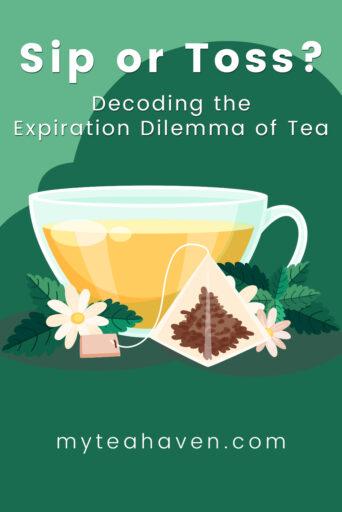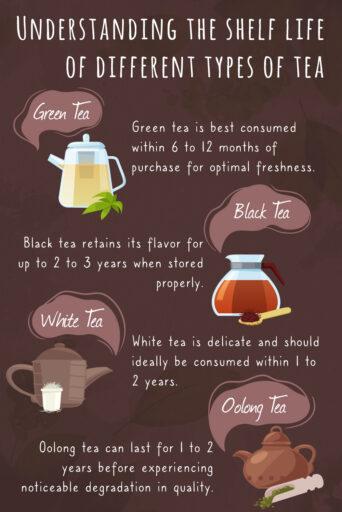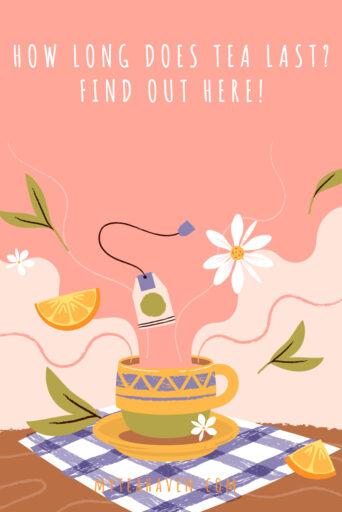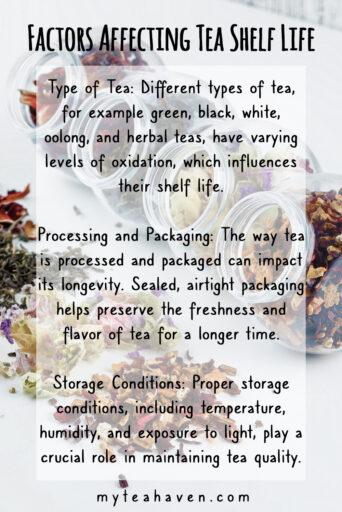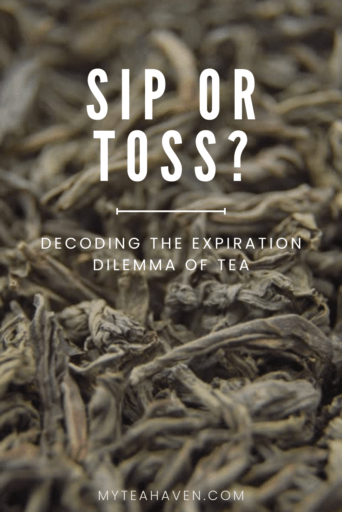Sip or Toss? Decoding the Expiration Dilemma of Tea
Does Tea Expire?
I absolutely adore tea and can never seem to have enough! Because of this, I frequently find myself with a variety of different teas in my pantry. From delicate green teas to robust black teas, I have them all. This can sometimes be a problem since tea does experience flavor degradation over time. Today we will explore the question: does tea expire? I will also provide a few helpful suggestions to avoid having your tea expire, and what you can still do with it if it does!
We are a participant in the Amazon Services LLC Associates Program, an affiliate advertising program designed to provide a means for us to earn fees by linking to Amazon.com and related sites. This post may contain affiliate links which means we may receive a commission, at no cost to you, for purchases made using our links. Please see my disclosure to learn more. Unless otherwise stated, all prices are in US$.
Understanding Tea Expiration
Tea is a natural product derived from the Camellia sinensis plant. It undergoes various processes such as withering, oxidation, and drying, which contribute to its distinct characteristics. Over time, the quality and freshness of tea can diminish due to exposure to air, light, heat, and moisture.

This gradual degradation is often referred to as tea expiration.
Factors Affecting Tea Shelf Life
Several factors can affect the shelf life of tea:
- Type of Tea: Different types of tea, for example green, black, white, oolong, and herbal teas, have varying levels of oxidation, which influences their shelf life.
- Processing and Packaging: The way tea is processed and packaged can impact its longevity. Sealed, airtight packaging helps preserve the freshness and flavor of tea for a longer time.
- Storage Conditions: Proper storage conditions, including temperature, humidity, and exposure to light, play a crucial role in maintaining tea quality.
Does Tea Expire?

Unlike perishable food items, tea does not actually have a fixed expiration date. Instead, it undergoes gradual flavor and aroma degradation over time.
While tea may still be safe to consume after its expiration date, the overall quality and taste will very likely not be what you want or expect.
Signs Your Tea Has Expired
It’s important to know the signs of expired tea to ensure you enjoy a fresh and flavorful cup every time.
Here are some indicators that your tea may have passed its prime:
- Stale Aroma: Expired tea may have a dull, musty, or off-putting smell.
- Faded Flavor: The taste of expired tea may become bland, flat, or unpleasant.
- Discolored Leaves: Certain types of tea leaves that have lost their vibrant color or turned brownish may no longer be at their best.
- Mold or Insects: Presence of mold, insects, or any signs of contamination indicates your tea is spoiled.
How to Properly Store Tea
To maximize the shelf life of your tea and maintain its quality, follow these storage guidelines:
- Airtight Containers: Store tea in airtight containers, such as metal tins or glass jars. This will protect your tea better from air and moisture.
- Cool and Dark Environment: Keep your tea away from direct sunlight and store it in a cool, dry place to minimize oxidation and flavor loss.
- Avoid Strong Odors: Tea can absorb strong odors from its surroundings, so it’s best to store it away from spices, coffee, or other strong-smelling substances.
Tips to Extend Tea Shelf Life
Here are some additional tips to help extend the shelf life of your tea:
- Buy in Small Quantities: I know buying tea can be all too tempting, but try to purchase tea in smaller quantities to ensure you consume it before it loses its freshness.
- Rotate and Use FIFO: Practice the “first in, first out” (FIFO) method, using the oldest teas first to maintain freshness.
- Refrigeration or Freezing: While not necessary for most teas, you can refrigerate or freeze certain types, such as matcha or delicate green teas, to prolong their shelf life.
Different Types of Tea and Their Shelf Life
Each type of tea has its own characteristics and shelf life. Here’s a breakdown of some popular types of tea and their typical shelf life if stored properly:
- Green Tea: Green tea is best consumed within 6 to 12 months of purchase for optimal freshness.
- Black Tea: Black tea retains its flavor for up to 2 to 3 years when stored properly.
- White Tea: White tea is delicate and should ideally be consumed within 1 to 2 years.
- Oolong Tea: Oolong tea can last for 1 to 2 years before experiencing noticeable degradation in quality.
- Herbal Tea: Herbal teas, such as chamomile or peppermint, can generally be enjoyed for up to 2 years.
Brewing Expired Tea: Is it Safe?
While drinking expired tea is unlikely to cause harm, it may not offer the same taste experience as fresh tea. The flavor and aroma could be compromised, resulting in a less enjoyable cup. It’s best to use fresher tea for a better experience!
Enjoying Tea Beyond its Expiration
If you find yourself with expired tea, there are a few ways that you can still enjoy it:
- Cooking and Baking: Expired tea leaves can be used to infuse flavor into recipes like cakes, cookies, or even savory dishes.
- DIY Potpourri: Create a fragrant potpourri by mixing dried tea leaves with other aromatic ingredients.
- Garden Compost: Use expired tea leaves as a natural compost to enrich your garden soil.

Best Practices for Buying Tea
To ensure you get the most out of your tea, follow these best practices when buying:
- Check Packaging: Inspect the packaging for airtight seals and ensure it provides adequate protection against moisture and light.
- Buy from Reputable Sources: Purchase tea from reputable brands or specialized tea shops known for their quality products. When buying tea online, check the reviews.
- Check Harvest Date: If available, check for the harvest date or the date when the tea was processed to gauge its freshness.
A Few Final Thoughts

Tea is like any other natural product and undergoes flavor degradation over time. While it doesn’t technically expire like milk would, the quality and taste of tea can diminish.
By understanding the factors affecting tea shelf life, proper storage techniques, and signs of expired tea, you can enjoy a fresh and flavorful cup every time.
Remember to buy tea in small quantities, rotate your stock, and follow best practices for buying tea.
So, make the most of your tea collection, brew it at its best, and savor every sip!
Some Questions You Might Have
- Can I drink tea past its expiration date?
While it may still be safe to consume, the quality and taste of tea may decline past its expiration date.
- Can I store tea in the refrigerator?
Refrigeration is not necessary for most teas but can be beneficial for certain types, like delicate green teas.
- How can I tell if my tea has gone bad?
Signs of expired tea include a stale aroma, faded flavor, discolored leaves, and maybe the presence of mold or insects.
- Can I brew expired tea?
Brewing expired tea should be safe if free from mold and insects, but the taste and quality may not be optimal. It’s best to use fresher tea for a better experience.
- How long does tea last if it’s unopened?
Unopened tea can generally retain its quality for a longer time, ranging from 1 to 3 years depending on the type.


